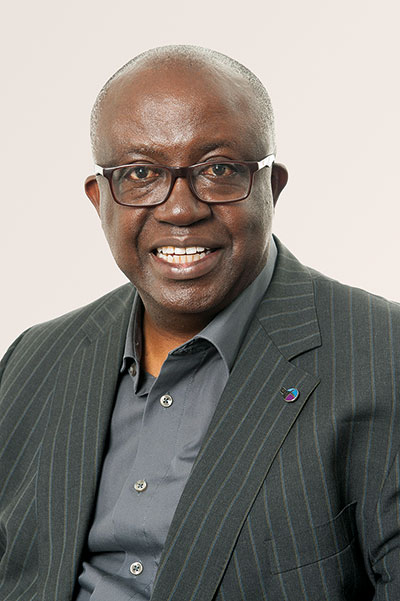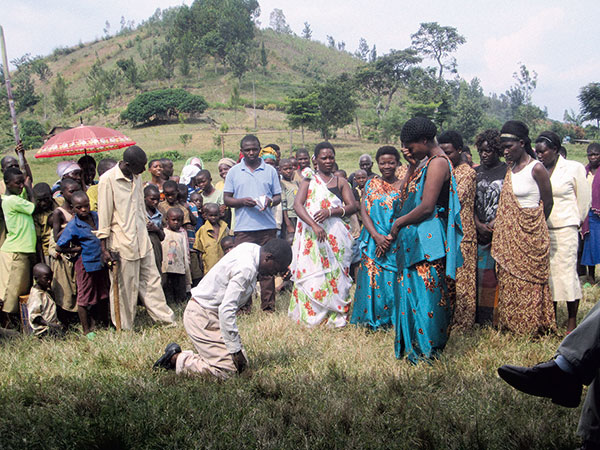In Rwanda credit unions help to find ways out of poverty and they offer a forum for reconciliation.
Interview: Thomas Becker
Photos: United Evangelical Mission
 John Wesley Kabango, born 1959 in Rwanda, where he survived the genocide in 1994. He is a minister in the Anglican Church and graduated at the Atlantic International University in Hawaii (USA). Since 2012 he has been director of the department for the Africa Region of the United Evangelical Mission (VEM) in Wuppertal.
John Wesley Kabango, born 1959 in Rwanda, where he survived the genocide in 1994. He is a minister in the Anglican Church and graduated at the Atlantic International University in Hawaii (USA). Since 2012 he has been director of the department for the Africa Region of the United Evangelical Mission (VEM) in Wuppertal.
Mr Kabango, how well known is Friedrich Wilhelm Raiffeisen in Rwanda?
Very much so, especially in well- educated circles and amongst those involved in credit unions. Many decision-makers in the government and in the church were inspired by his thinking, when the first co-operative credit unions were founded in Rwanda in the mid-1990s. At the time I was given the task by the Anglican and Presbyterian Churches of implementing these in rural areas. After the civil war and genocide in 1994 during which nearly one million people died, we wanted to develop credit unions in order to combat the poverty in the country. In our preparations for that we looked at Germany and at Raiffeisen, whose co-operatives were so successful in the 19th century. In 1998 the VEM facilitated a training course in micro-credit, in which I took part. I then went on to set up my own credit union, on the basis of the Raiffeisen model among others, in which even the poorest were able to participate.
How was the situation in Rwanda after the genocide?
On behalf of the church at the time, we carried out surveys in the villages and the results were horrifying. For all of them there was a lack of education, of clothing, of food and of housing. One problem was that those who had no money were excluded from the banking system. They could not obtain credit, not even for minimal amounts, because they could be shown to be totally impoverished people with no income and without any possessions or property. This particularly affected widows and orphans, of whom there were tens of thousands after the Rwandan war.
How did the churches help to establish co-operatives at that time?
We wanted to offer people a long-term perspective, so we did not just distribute finances with a scattergun approach, spreading them thinly, but offered help towards self-help. A decisive element of this was the concept of credit unions, which we wanted to establish in the rural areas. All of the inhabitants of the village would belong to it and would pay small amounts into it, so that then even the poorest could take out a loan. This made it possible for example for borrowers to buy a cow, which would then produce not just milk but also dung for the cultivation of crops in the fields. Others have bought chickens, goats, rabbits or seeds, and yet others bought bicycles, solar cells or commercial goods that they could then sell in the market.
How high was the level of contributions for the co-operatives?
Each member had to pay a minimum of one euro into the fund. Just as with a bank, that money is not then lost to those who paid into it. This was because the borrowers had to pay back the borrowed money after five months. Interest was also payable, though clearly lower than other interest rates.
Was the idea taken up?
Yes. Many village communities founded their own credit unions, of which there are by now several hundred in Rwanda. I am myself still a member of the savings and credit union SACCO and pay money into it every month. At the moment that is only 120 euros. So far I have never asked for credit myself, but I know that others have access to it, who are dependent on it. That is why I do it. Credit unions have also contributed to the work of reconciliation in Rwanda.
To what extent?
After the genocide both victims and perpetrators in the towns and villages were living in the immediate neighbourhood of one another. I experienced this pain for myself in my home town Gitarama in central Rwanda. The genocide there was devastating. Four of my own brothers were killed, two of them with machetes, where I personally knew the people who had done it. After the perpetrators had served their sentences, they returned to their villages.
How did you react to that?
As a minister I saw my duty at the time to enable encounters and to initiate work for reconciliation. A first step was to bring together victims and perpetrators and to offer victims the opportunity to express their suffering, their mourning and their pain. As a second step those who had been accused appeared before the community and asked for forgiveness. At the same time they were given the opportunity to explain themselves and to say, for instance, if they had been forced or blackmailed into the act of committing murder. As the third stage it was for the victims to be ready to forgive. And here the co-operatives came into play again. Suddenly the whole community was pulling together. If you want to work together then it is important to co-operate. And we all had a common goal: to combat poverty. Poverty takes no account of ethnic distinctions, nor does it recognise victims and perpetrators. Poverty makes everyone equal.
Would it have been right for perpetrators to pay a higher membership fee into the co-operative?
No, we didn’t want that. There was an International Criminal Tribunal at which the main perpetrators were sentenced. Many were released from prison early and in return had to undertake social services such as building homes for widows and orphans. If they then joined the co-operatives, then the same rules applied to everyone. That was important for the reconciliation process. It is naturally a long process that is continuing up to the present day. But I have visited many co-operatives in local communities where the victims and perpetrators not only work together as members, but also support one another as friends.
How have the co-operatives developed in Rwanda over the last 20 years?
There are some very positive examples, but also some problems which I do not want to deny: in some co-operatives there was mismanagement. Another problem arose when the creditors did not pay back part of the money, which was more often the case with men. On the whole it can be noted that the most successful co-operatives are the ones run by women. Here, the repayment rates are extremely high.
So the positive effects are predominant?
Yes, certainly. When I was in Rwanda a few weeks ago I met two youngsters who had bought themselves bicycles with the help of microcredit. The used them as taxis and were able to use the money to contribute towards the feeding of their families. It is also evident that more young people are going on to secondary schools than was the case twenty years ago. If you ask children about the reason why they can go to school, you very often hear that this has been made possible through microcredit, with which the parents are able to buy pens and books. These are very important results.
So are credit unions the solution to reducing poverty in Rwanda?
They make an important contribution. The overall need is for a sustainable strategy embracing all areas of life and economics. In order to implement further developments we have to ask ourselves “Where are we now? Where do we want to go? How can we achieve our goals?” And we also have to ask questions about indicators for the future, by means of those already established, those we have already achieved. The two bicycles of those youngsters are just such indicators. For that reason I feel able to encourage the local churches and the partner groups to continue their commitment to working together.
What might this commitment look like with an eye to the co-operatives?
Education and training is very important. Even in Rwanda, credit unions have a lot of money at their disposal to some degree. So we need well-qualified business people, with a good understanding of their profession. The foundation for this is a good education, and the foundations for that need to be laid already in childhood. Microcredit is also a great help towards achieving this, as it benefits the families.
INFO
Anyone interested in investing in credit unions can go to Oikocredit, an internationally active association founded by the World Council of Churches. In Germany the Fair-World-Fund, set up by the Bank for Church and Diaconia (KD-Bank), the GLS Bank and the Protestant aid agency Brot für die Welt (Bread for the World), invests in businesses which offer microcredit to people in countries where there is development co-operation.

0 Kommentare zu “Little money, great happiness”